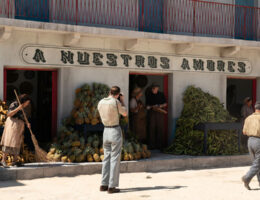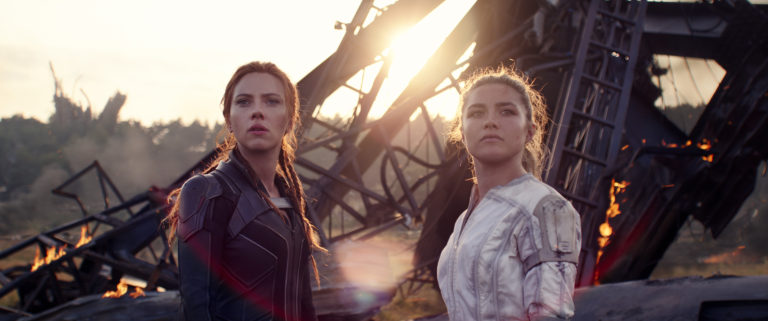Black Widow (2021 | USA | 134 minutes | Cate Shortland)
Despite having appeared in six Marvel Cinematic Universe features and having ascended to the leader of the Avengers by its Endgame audiences never really got to know Scarlett Johansson’s Black Widow. Whereas other core team members like Captain America, Iron Man, Thor, and even multiple Hulks were the subject of multiple standalone stories to flesh out their backstories, the history and motivations of reformed Russian spy Natasha Romanoff was always left to a series of offhand allusions to a vaguely dark, cryptically complicated past. On top of that, her characterizations in previous films were notably mismanaged, leveraging her slippery biography to force her into whatever mold the storytellers needed her to fit to serve the other heroes around her. Alas, it took a tragic sacrifice (and then a pandemic delay) to give her the spotlight she deserved, albeit in flashback form to fill in the long-missing pieces.
Nevertheless, like almost everything that emerges from Kevin Feige’s multi-tentacled superhero operation, Black Widow is a very strong piece of storytelling that’s also a pretty good hang. It benefits from the self-evident fact that Scarlett Johansson is a regularly-compelling movie star who has more than enough charisma and screen presence to carry both blockbusters and indie dramas alike. While she demonstrates that capability here, some very strong casting assures that she doesn’t have to go it alone.
Cate Shortland admirably makes the leap from directing festival darlings to helming globe-spanning MCU wide-release enterprises. Working from a screenplay by Marvel Studios journeyman Eric Pearson (with story by credit to WandaVision executive producer Jack Shaeffer and relative newcomer Ned Benson), the film sets the scene with an effective prologue that finds young Natasha (already displaying a fondness for hair dye) and her younger sister Yelena growing up in a suburban Ohio, raised by a lab tech played by the Internet’s Favorite Dad David Harbour and way-too-elegant tough-but-caring Rachel Weisz. Their idyllic domestic tranquility of sun-dappled backyards and fireflies filling the night sky is soon upset by an abrupt escape sequence that finds the family fleeing the country and upending their lives. From there, an opening credits montage (per nostalgic cinema conventions for re-imagined nostalgia, it’s set to a slowed cover of “Smells Like Teen Spirit” by Malia J) shorthands the rigorous training that goes into training little girls to be professional killers, intercut with the role of these Soviet super-spies in upsetting the world order.
By the time the musical memory download is finished, twenty-one years have passed and we’re at the point in the MCU timeline where the Avengers’ two dads Tony Stark and Steve Rogers have taken a little time apart, via irreconcilable differences over compliance with the Sokovia Accords. Rebels like Steve and Natasha (and, I guess Hawkeye?) have scattered to the winds and are on the run from the feds. Without giving away major spoilers or “story points”, most of Black Widow takes place in this pocket universe, lodged between the Civil and Infinity Wars, with Natasha hiding out in the middle of a neutral nowhere, supplied with necessities and memory boxes from an old pal and fixer played with comedic charm by O-T Fagbenle.
It wouldn’t be a Marvel if Romanoff’s little staycation didn’t eventually get upended by a menacing blast from her past, setting her off on a global adventure complete with car chases, well-choreographed fight sequences, and awkward family reunions. Hopping from location shoots including Norway, Budapest, Morocco and some approximations of snowy Russia and remote unspecified Eastern Europe, the film also introduces Florence Pugh as Natasha’s long-separated sister Yelena. Their sibling rivalry and rapport are established with a mix of credible sister-fights (complete with fisticuffs, knife play, and firearm standoffs) as well as a mix of projections of strength, dry quick-witted humor, and the ability to instantly identify each others’ vulnerabilities. Pugh embodies the energy of a younger kid who grew up envious of her older sister, magnified by decades of murderous service to an evil empire, and multiplied by that sibling turning out to be a world famous superhero. Their fights have the feeling of real long-simmering family dynamics and their interactions ring true of an uneasy reunion. In fact, Pugh’s presence in the film is so magnetic that one wonders if this film is more a launching pad for Florence Pugh into the MCU than a bookend to Black Widow’s storyline.
Nevertheless, the squabbling sisters find enough common cause to team up, furthering the family reunion to include jailbreaks, visits to hypnotized pig farms, and surprisingly-comprehensible aerial sequences in service of confronting (in very literal terms) one of the more morally questionable elements in the Natasha Romanoff wikipedia entry. Harbour emerges as a hilarious paternal buffoon fixated on his own past conquests; Weisz as a cryptic mother-figure with uncertain motivations. Like many a franchise, Black Widow has a fixation on chosen families, and the interplay between this foursome instantly engenders an entertaining and surprisingly resonant tapestry for all of the requisite quests and schemes needed to advance the plot.
Ultimately, it’s a pity that it took this long to put Johansson front and center in this cinematic universe and that her turn headlining a film is necessarily one that takes place entirely in background. But if you can put these worthy gripes aside, Marvel’s return to cinemas (and premium on-demand) after a strong year of small screen serials feels like a major success. They’re great at cobbling these collegial gangs together, having fun with the ensuing action, and grounding them in character, even when the enemies include shadowy schemers and bionic enhanced nemeses. That the action also makes room for stories of explicit female empowerment over the megalomaniacal forces that trained and subjugated these heroes for their own purposes seems like an overdue step in the right direction. It’s a thoroughly enjoyable ride and one that rarely lags as it speeds to its conclusion. Now let’s just see about diversifying the action figure portfolio?
Black Widow launches simultaneously in theaters and on Disney+ with Premier Access on July 9, 2021.




